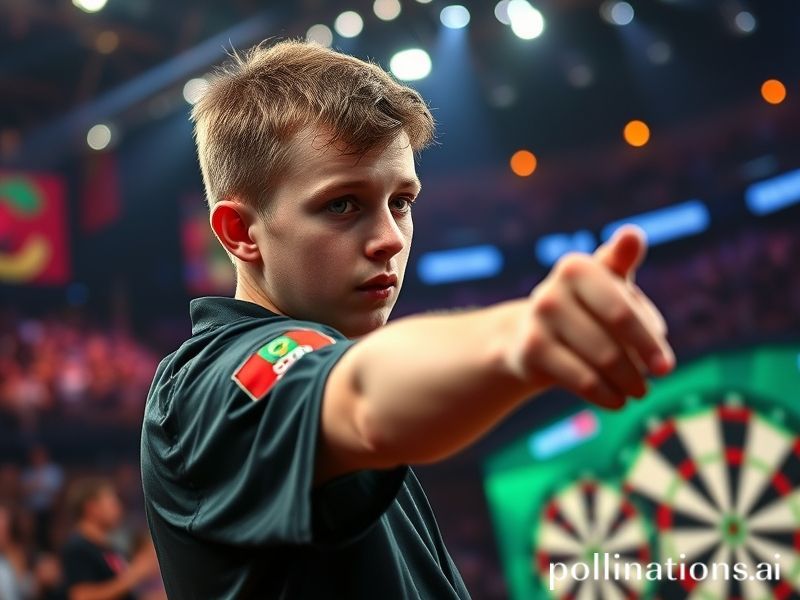World Holds Breath as British Teen Turns Darts Into Global Soft-Power Missile
It began, as most modern miracles do, with a viral clip: a cherubic 16-year-old from Warrington, England, flattening men twice his age on the oche like a cosmic steamroller powered by Monster Energy and GCSE stress. Luke Littler’s run to the PDC World Darts Championship final wasn’t just a sporting anomaly; it was a Rorschach test for a planet that can’t decide whether to celebrate precocious talent or wallow in its own mediocrity.
From Manila betting shops to Melbourne pubs, the kid they call “The Nuke” detonated across time zones. Filipino taxi drivers paused their K-dramas to watch a sport they previously filed under “British things that aren’t James Bond.” In Lagos, a sports-bar owner booted the Premier League off the main screen after discovering more punters would wager on whether a teenager could hit double-16 than on whether Chelsea could hit a cross. Global bookmakers—those charming merchants of hope—reported a 300 % spike in darts handle, proving yet again that humanity will gamble on literally anything that moves, including a 26-gram tungsten missile.
The economic footprint is already visible. German TV execs, frantic for content cheaper than Bundesliga rights, have scheduled midnight reruns of Littler’s matches between infomercials for orthopedic mattresses. Japanese variety shows dispatched correspondents to Warrington, hoping to bottle whatever pheromone allows a child to remain ice-cool while grown men sweat through their polyester. Even the Swiss—who usually reserve excitement for quarterly interest-rate statements—have listed “teenage dart prodigy” as a measurable risk factor in their national coolness index.
Of course, the darker implications hover like stale lager. Littler’s ascent arrives precisely as the world’s traditional ladders of merit—higher education, stable wages, affordable housing—resemble broken pub stools. Watching a 16-year-old earn £200k before he can legally celebrate with champagne is the cruelest sort of motivational poster: Work hard, kids, and maybe you too can flee the economic void by flinging pointy objects at a wall. Meanwhile, the BBC breathlessly reminds us this is “good news,” the same way medieval heralds announced the king’s new scapegoat.
Diplomats, never ones to miss a soft-power angle, have already begun weaponizing the phenomenon. The British embassy in Washington discreetly floated the idea of a Littler exhibition match against an American child selected via TikTok, code-named “Transatlantic Treble-20 Summit.” Downing Street spin doctors envision the teen as a unifying distraction—something to tweet about that isn’t inflation, sewage, or the Prime Minister’s Spotify playlist. Across the Channel, Macron’s advisers have reportedly asked if France can borrow him for Bastille Day, presumably to throw darts at a cardboard cutout of Brexit.
Still, the sharpest irony may be technological. Littler perfected his craft on an at-home board rigged with laser sensors and an AI coach named “Karen,” who chirps corrections in Siri’s calmest tone. In other words, the kid who just humanized a 280-year-old pub game did so by outsourcing practice feedback to a disembodied algorithm. Somewhere, a Silicon Valley engineer is updating his pitch deck: “Uber, but for dart-flinging childhoods.” Investors nod solemnly and reach for their checkbooks.
And what of Luke himself? Between matches he scrolls through death threats from grown men whose mortgages depend on his left arm, and sponsorship offers from companies that also sell vaping juice. He has, by accident, become the world’s youngest case study in monetized adolescence—proof that if you’re British, talented, and slightly uncool, the empire will still find a way to brand you.
Conclusion: The planet has briefly synchronized around a 16-year-old in borrowed trousers, and for once the memes are almost sweet. For a fortnight we forgot to argue about tariffs or TikTok bans and instead watched a kid count backwards from 501, the universal language of subtraction. When the circus folds and the bookies cash out, Littler will still have algebra homework, and we’ll still have late-stage capitalism. But somewhere in Manila a barker is already chalking odds on the next prodigy, because hope, like darts, is a thing we throw at the wall and pray sticks.







